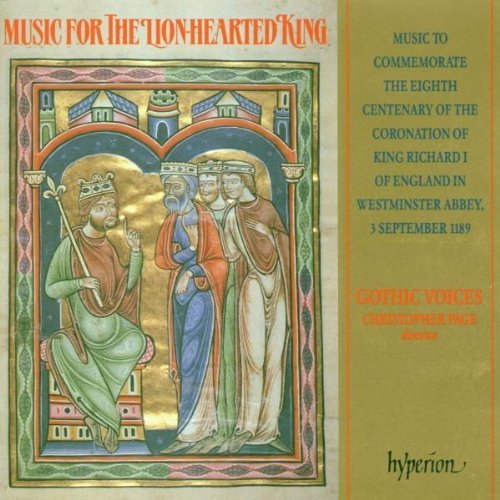
Gothic Voices & Christopher Page - Music For The Lion-Hearted King (1989)
BAND/ARTIST: Gothic Voices, Christopher Page
- Title: Music For The Lion-Hearted King
- Year Of Release: 1989
- Label: Hyperion
- Genre: Classical
- Quality: FLAC (image + .cue, log, booklet)
- Total Time: 60:13 min
- Total Size: 274 MB
- WebSite: Album Preview
Tracklist:
01. Mundus vergens
02. Novus miles sequitur
03. A la doucour de la bele seson
04. Sol sub nube latuit
05. Hac in anni ianua
06. Anglia, planctus itera
07. Etas auri reditur
08. Vetus abit littera
09. In occasu sideris
10. L'amours dont sui espris
11. Purgator criminum
12. Li nouviauz tanz
13. Pange melos lacrimosum
14. Ma joie me semont
15. Ver pacis apperit
16. Latex silice
01. Mundus vergens
02. Novus miles sequitur
03. A la doucour de la bele seson
04. Sol sub nube latuit
05. Hac in anni ianua
06. Anglia, planctus itera
07. Etas auri reditur
08. Vetus abit littera
09. In occasu sideris
10. L'amours dont sui espris
11. Purgator criminum
12. Li nouviauz tanz
13. Pange melos lacrimosum
14. Ma joie me semont
15. Ver pacis apperit
16. Latex silice
Some aspects of being human must be "transhistorical," according to Christopher Page; sustained exposure to the music of the past opens a window onto how past humans experienced that music. Page has devoted a prolific corner of his life to using music to bridge the historical gap between human beings: Gothic Voices, the vocal ensemble he has directed since its founding in 1980. The group, clearly one of the world's leaders in the performance of medieval music, gives concerts quite frequently in England, as well as continental Europe, America, and Canada; their close relationship with Hyperion Records has resulted in nearly twenty critically-acclaimed recordings (and no less than three Gramophone Awards). Spanning musics from Hildegard of Bingen to the turn of the sixteenth century, they consistently present music of outstanding quality, with the highest standards of performance. Their vocal sound is a conscious blend of "scrupulously accurate" tuning, sensitive phrasing, careful rhythmic articulation, and a bright and clear vocal production. Their first recording, A Feather on the Breath of God, coincided with the release of Ensemble Sequentia's Ordo virtutem, and helped launch the international resurgence in interest in Hildegard's music. Since that time, the bulk of their work has been in the music of France and England, from the thirteenth to the fifteenth centuries. One series entitled the Spirits of England and France contains, for instance, recordings of two anonymous early English Masses, as well as a luscious recording of Binchois chansons and one of the best performances of Trouvère lyrics in print. Fascinatingly, a 1998 La Rue disc betrays some vocal uncertainty, as the group approaches music outside the repertories in which it has lived so securely. Christopher Page himself considers two recordings from the early 1990s (The Medieval Romantics and Lancaster and Valois) to represent a watershed in the life of the ensemble, when they acquired the services of two baritones whose voices so elegantly fit the group's sound. More prominently, it was also at this time that his "experiments" with vocalization of untexted chanson lines came to fruition. Though Christopher Page himself is a philologist by training, lecturing in Anglo-Saxon, Middle English, Old French, and Latin at Cambridge University, his printed scholarship on medieval music has been highly influential (even inflammatory). His writings on music sensitively and deeply consider the role of music in medieval European life, as well as specific issues of performance practice. One of these has been dubbed by a furious critic the "English a cappella heresy": the argument that British singers steeped from an early age in Cathedral choir singing have evolved a natural proclivity towards compelling performances of vocal Early Music. Gothic Voices (with the Hilliard Ensemble, etc.), English groups which sing their music principally without instruments, and often one to a voice part, demonstrably bring a nearly inhuman clarity to vocal polyphony. One unique contribution of Gothic Voices to this performing tradition is the "experiment" of complete chanson vocalization. Whereas an earlier generation of performers freely orchestrated the untexted lines of medieval secular song, Page (coincidentally a fine harpist) believed that evidence in medieval literature supported the notion of "instrumental" singers on untexted lines. He developed a system of all-vowel vocalises, and proceeded to enact his theory in sound through the ensemble. While this theory has not even approached universal acceptance, his characteristic blend of careful scholarship and unquestionable results in performance uses all his professional and artistic acumen to bring the music of the past alive to our ears.
Related Release:
Classical | FLAC / APE | CD-Rip
As a ISRA.CLOUD's PREMIUM member you will have the following benefits:
- Unlimited high speed downloads
- Download directly without waiting time
- Unlimited parallel downloads
- Support for download accelerators
- No advertising
- Resume broken downloads


